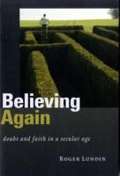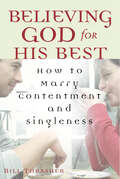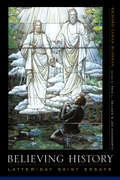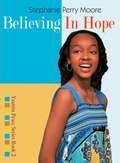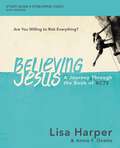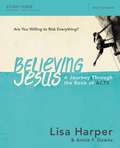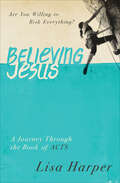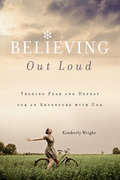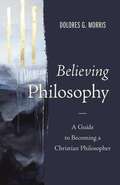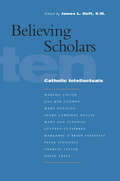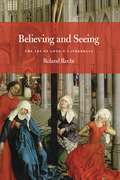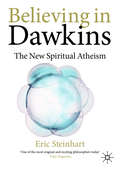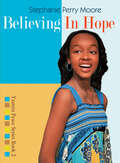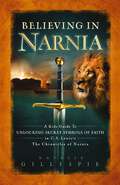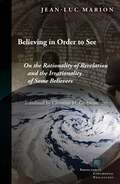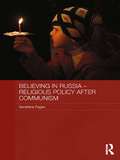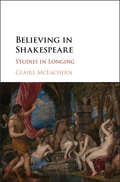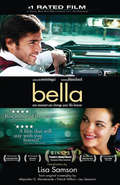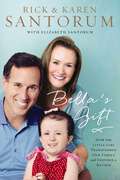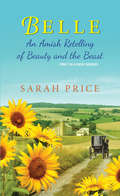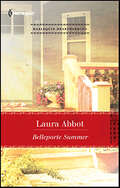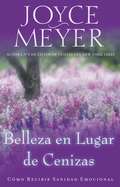- Table View
- List View
Believing Again: Doubt and Faith in a Secular Age
by Roger LundinIn Believing Again Roger Lundin brilliantly explores the cultural consequences of the rather sudden nineteenth-century emergence of unbelief as a widespread social and intellectual option in the English-speaking world. Lundin's narrative focuses on key poets and novelists from the past two centuries Dostoevsky, Dickinson, Melville, Auden, and more showing how they portray the modern mind and heart balancing between belief and unbelief. Lundin engages these literary luminaries through chapters on a series of vital subjects, from history and interpretation to beauty and memory. Such theologians as Barth and Balthasar also enter the fray, facing the challenge of modern unbelief with a creative brilliance that has gone largely unnoticed outside the world of faith. Lundin's Believing Again is a beautifully written, erudite examination of the drama and dynamics of belief in the modern world. In Believing Again Roger Lundin brilliantly explores the cultural consequences of the rather sudden nineteenth-century emergence of unbelief as a widespread social and intellectual option in the English-speaking world. Lundin's narrative focuses on key poets and novelists from the past two centuries Dostoevsky, Dickinson, Melville, Auden, and more showing how they portray the modern mind in tension between faith and doubt. Lundin engages these literary luminaries through chapters on a series of vital subjects, from history and interpretation to beauty and memory. Such theologians as Barth and Balthasar also enter the discussion, facing the challenge of modern unbelief with a creative brilliance that has gone largely unnoticed outside the world of faith. Lundin's Believing Again is a beautifully written, erudite examination of the drama and dynamics of belief in the modern world.
Believing Christ: The Parable of the Bicycle and Other Good News
by Stephen E. RobinsonAuthor Stephen Robinson illustrates the power of the Savior as he uses analogies and parables, such as his own bicycle story, and scriptures and personal experiences in this moving, best-selling book. "Mortals have finite liabilities," he explains, "and Jesus has unlimited assets." By merging the two, exaltation can come. As long as we progress in some degree, the Lord will be pleased and will bless us. We must not only believe in Christ but also believe him -- believe that he has the power to exalt us, that he can do what he claims. People will better understand the doctrines of mercy, justification, and salvation by grace after reading this book.
Believing God for His Best: How to Marry Contentment and Singleness
by Bill ThrasherWhat are you waiting for? If you're among the growing ranks of single adults, chances are you're waiting for Mr. or Miss Right. And while waiting is an important aspect of the Christian life, it's not easy. No one knows this better than Bill Thrasher. He spent almost two decades in adulthood before marrying his wife, and now shares the secret of successful single living--contentment.Believing God for His Best is a personal story that will walk you through Thrasher's journey through singleness, and toward marriage. The anecdotal style, coupled with godly wisdom, will inspire singles to trust God for His best.
Believing God for His Best: How to Marry Contentment and Singleness
by Bill ThrasherWhat are you waiting for? If you're among the growing ranks of single adults, chances are you're waiting for Mr. or Miss Right. And while waiting is an important aspect of the Christian life, it's not easy. No one knows this better than Bill Thrasher. He spent almost two decades in adulthood before marrying his wife, and now shares the secret of successful single living--contentment.Believing God for His Best is a personal story that will walk you through Thrasher's journey through singleness, and toward marriage. The anecdotal style, coupled with godly wisdom, will inspire singles to trust God for His best.
Believing History: Latter-day Saint Essays
by Richard Lyman BushmanThe eminent historian Richard Bushman here reflects on his faith and the history of his religion. By describing his own struggle to find a basis for belief in a skeptical world, Bushman poses the question of how scholars are to write about subjects in which they are personally invested. Does personal commitment make objectivity impossible? Bushman explicitly, and at points confessionally, explains his own commitments and then explores Joseph Smith and the Book of Mormon from the standpoint of belief.Joseph Smith cannot be dismissed as a colorful fraud, Bushman argues, nor seen only as a restorer of religious truth. Entangled in nineteenth-century Yankee culture—including the skeptical Enlightenment—Smith was nevertheless an original who cut his own path. And while there are multiple contexts from which to draw an understanding of Joseph Smith (including magic, seekers, the Second Great Awakening, communitarianism, restorationism, and more), Bushman suggests that Smith stood at the cusp of modernity and presented the possibility of belief in a time of growing skepticism. When examined carefully, the Book of Mormon is found to have intricate subplots and peculiar cultural twists. Bushman discusses the book's ambivalence toward republican government, explores the culture of the Lamanites (the enemies of the favored people), and traces the book's fascination with records, translation, and history. Yet Believing History also sheds light on the meaning of Joseph Smith and the Book of Mormon today. How do we situate Mormonism in American history? Is Mormonism relevant in the modern world? Believing History offers many surprises. Believers will learn that Joseph Smith is more than an icon, and non-believers will find that Mormonism cannot be summed up with a simple label. But wherever readers stand on Bushman's arguments, he provides us with a provocative and open look at a believing historian studying his own faith.
Believing In Hope (Yasmin Peace Series, #2)
by Stephanie Perry MooreIn this second book of the Yasmin Peace series, family tensions and school unrest soar to a fever pitch. A school counselor begins the LIGHT club, a club dedicated to helping eighth grade girls deal with issues like gangs, depression, teen suicide, and self esteem. Yasmin discovers that there is hope on the other side of every obstacle if she holds on to her faith. This book reminds us of Yasmin's determination to keep her family together. Even as some situations seem to get worse, she realizes that her hope is in the Lord, and we witness how she learns to rely on Him.
Believing Jesus Bible Study Guide plus Streaming Video: A Journey Through the Book of Acts
by Lisa HarperJourney through the biblical stories of the early Christian movement, and see what kind of wild adventures await those who truly believe Jesus.Throughout the book of Acts, believing Jesus and what he said is the core value that marked every believer in the first church. Because they believed Jesus, the early Christians were willing to risk everything—their comfort, their homes, even their lives.In this eight-session video Bible study (streaming included), Lisa Harper launches into the book of Acts to discover how Jesus' command to spread the gospel changed the lives of those who believed and shaped the culture that surrounded the growing church. At the end of this journey together, not only will you have studied this wild, adventurous, risk-taking book of the Bible; but you'll see how God supernaturally orchestrated the events in Scripture to bring about the message of salvation that the early believers preached.Today, we are faced with the same risks. Will we truly believe the words of Jesus and allow them to transform every part of our lives?This study guide has everything you need for a full Bible study experience, including:The study guide itself—with discussion questions, conversation starters, video notes, and a leader's guide.An individual access code to stream all eight video sessions online (you don't need to buy a DVD!). Sessions and video run times:The Declarations that Define Us (21:30) – The book of Acts, an extension of Luke's gospelEarth, Wind, and Celestial Fire (19:00) – The Holy Spirit's dramatic entranceCheckered Pasts Can Make Incredible Preachers (21:00) – The powerful preaching of Peter and PaulWhat&’s Mine Is Yours (20:00) – Finding freedom in freely givingLoving More People, More (16:00) – A challenge to welcome everyoneThe Need to Be ReGospeled (19:30) – Even Peter and Paul made mistakes along the wayTurning Your World Upside Down (20:00) – A closer look at THIS Jesus: the one we're followingBearing the Chain Because (24:00) – Anything is worth seeing the gospel suddenly click for someone Watch on any device!Streaming video access code included. Access code subject to expiration after 12/31/2027. Code may be redeemed only by the recipient of this package. Code may not be transferred or sold separately from this package. Internet connection required. Void where prohibited, taxed, or restricted by law. Additional offer details inside.
Believing Jesus Study Guide: A Journey Through the Book of Acts
by Lisa HarperWhat does it mean to believe Jesus? Not just believe in Jesus, but actually believe what He said--and shape our lives around that truth? How would that affect the choices we make? The way we see the world? The way we conduct ourselves with other Christians? In Believing Jesus, Lisa Harper answers these questions by looking at lives of the believers in the book of Acts and how Jesus' command to spread the gospel to the ends of the earth forever shaped their lives. You will read stories of how Peter transformed from "Benedict Arnold" to "Billy Graham" when the power of the Holy Spirit came over him. How the first community of believers was a place like the beloved Cheers of sitcom fame where everyone knew each others' names and needs. How it cost Stephen and other early believers their very lives to follow Christ. And how Paul's case proves that God's grace can change the worst of sinners into saints, making us willing to have our lives interrupted by God and truly bloom wherever we are planted. Today, we are faced with the same decisions the early church faced. Will we, like them, truly believe the words of Jesus and allow them to transform every part of our lives?
Believing Jesus: A Journey Through the Book of Acts
by Lisa HarperAre you truly willing to risk everything? In Believing Jesus, Bible teacher and author Lisa Harper retraces the steps of the apostles in the book of Acts, while throwing in a few of her own crazy adventures along the way. The disciples didn&’t have much of a road map after Jesus ascended to heaven, but God&’s grace and spirit filled in the gaps as they moved forward. It required their willingness to risk everything to establish a new community that would change the future world.As a regular speaker on the Women of Faith® tour, Lisa has earned a reputation as a true theological scholar and hilarious storyteller—not necessarily in that order! Best-selling author and pastor Max Lucado calls Lisa one of the &“best Bible tour guides around.&”Believing Jesus will highlight both of Lisa&’s strengths as she tackles every chapter of the Book of Acts with biblical wisdom and modern wit. Lisa keeps it real, telling stories on herself and pointing readers back to Jesus, the only one who can truly lead.
Believing Out Loud: Trading Fear and Defeat for an Adventure with God
by Kimberly Wright"Fear and low self-worth can prevent people from answering God's call on their lives. But courage and dignity are found at the cross. When people accept God's invitation for an adventure, they will have great stories to tell. And who doesn't love a great story?Many people believe fear is something with which they just have to live. However, God's Word contradicts that belief. 2 Timothy 1:7 tells us, ""For God did not give us a spirit of timidity, but a spirit of power, of love, and of self-discipline.""Our lack of self-worth will dictate what we do or do not do for God, as well as how we treat those around us. It will allow us to compromise our moral values to feel loved or accepted. You have value because God says you do--not because of what I or anyone else says. Learning to identify ourselves in Christ doesn't happen overnight--it is a journey of steps forward and sometimes backward.Obeying God's calling on our lives will lead us on a miraculous adventure. We will burst with stories to share with others. God wants to give you those kinds of stories. He wants to blow your mind and let you experience his miracles. You may feel like the most unlikely choice for God to use in a mighty way; but remember, we don't operate on feelings, we live by truth. Let God take you on an adventure and live a great story."
Believing Philosophy: A Guide to Becoming a Christian Philosopher
by Dolores G. MorrisPhilosophy has been a part of Christianity since its earliest days, and theistic philosophy predates Christianity by thousands of years. But Christians today often don't realize or are skeptical of all that philosophy can offer them. Believing Philosophy introduces Christians to philosophy and the tools it provides to believers, helping them understand, articulate, and defend their faith in an age of unbelief.In Part 1 of the book, author Dolores G. Morris explains why Christians should read and study philosophy. She begins with a helpful historical overview of Christian philosophy from the church fathers to contemporary philosophers and then introduces the basic resources of philosophical reasoning: the role and aim of reason, distinctions between truth and reason and provability, and learning to read like a philosopher. These chapters address three foundational questions:What is philosophy?Why should a Christian study philosophy?How should a Christian study philosophy?In Part 2, Morris introduces students to philosophical arguments and questions relevant to Christians. She presents arguments by three key branches of philosophy: metaphysics, epistemology, and practical philosophy. Building on concepts introduced in Part 1, she explains what philosophical arguments are and how they ought to be evaluated from a philosophical and Christian perspective. The following chapters examine specific questions most pressing for Christians today:The problem of evilRationality and faithFree willSkeptical theismThe moral argument for the existence of GodReformed epistemologyEach chapter introduces the problem, explains Christian responses, discusses the strengths and weaknesses of each response, and leaves the final verdict to the reader. Finally, each chapter concludes with a list of recommended further readings.
Believing Scholars: Ten Catholic Intellectuals
by James L. HeftHow do Catholic intellectuals draw on faith in their work? And how does their work as scholars influence their lives as people of faith?For more than a generation, the University of Dayton has invited a prominent Catholic intellectual to present the annual Marianist Award Lecture on the general theme of the encounter of faith and profession. Over the years, the lectures have become central to the Catholic conversation about church, culture, and society.In this book, ten leading figures explore the connections in their own lives between the private realms of faith and their public calling as teachers, scholars, and intellectuals.This last decade of Marianist Lectures brings together theologians and philosophers, historians, anthropologists, academic scholars, and lay intellectuals and critics.Here are Avery Cardinal Dulles, S.J., on the tensions between faith and theology in his career; Jill Ker Conway on the spiritual dimensions of memory and personal narrative; Mary Ann Glendon on the roots of human rights in Catholic social teaching; Mary Douglas on the fruitful dialogue between religion and anthropology in her own life; Peter Steinfels on what it really means to be a “liberal Catholic”; and Margaret O’Brien Steinfels on the complicated history of women in today’s church. From Charles Taylor and David Tracy on the fractured relationship between Catholicism and modernity to Gustavo Gutiérrez on the enduring call of the poor and Marcia Colish on the historic links between the church and intellectual freedom, these essays track a decade of provocative, illuminating, and essential thought. James L. Heft, S.M., is President and Founding Director of the Institute for Advanced Catholic Studies and University Professor of Faith and Culture and Chancellor, University of Dayton. He has edited Beyond Violence: Religious Sources for Social Transformation in Judaism, Christianity, and Islam (Fordham).
Believing and Seeing: The Art of Gothic Cathedrals
by Roland Recht Mary WhittallIn addition to the great cathedrals of France, Recht explores key religious buildings throughout Europe to reveal how their grand designs supported this profusion of images that made visible the signs of scripture. Metalworkers, for example, fashioned intricate monstrances and reliquaries for the presentation of sacred articles, and technical advances in stained glass production allowed for more expressive renderings of holy objects. Sculptors, meanwhile, created increasingly naturalistic works and painters used multi-hued palettes to enhance their subjects' lifelike qualities. Re-imagining these works as a link between devotional practices in the late Middle Ages and contemporaneous theories that deemed vision the basis of empirical truth, Recht provides students and scholars with a new and powerful lens through which to view Gothic art and architecture.
Believing in Dawkins: The New Spiritual Atheism
by Eric SteinhartDawkin's militant atheism is well known; his profound faith less well known In this book, atheist philosopher Eric Steinhart explores the spiritual dimensions of Richard Dawkins’ books, which are shown to encompass:· the meaning and purpose of life· an appreciation of Platonic beauty and truth· a deep belief in the rationality of the universe· an aversion to both scientism and nihilism As an atheist, Dawkins strives to develop a scientific alternative to theism, and while he declares that science is not a religion, he also proclaims it to be a spiritual enterprise. His books are filled with fragmentary sketches of this ‘spiritual atheism’, resembling a great unfinished cathedral. This book systematises and completes Dawkins’ arguments and reveals their deep roots in Stoicism and Platonism. Expanding on Dawkins’ ideas, Steinhart shows how atheists can develop powerful ethical principles, compelling systems of symbols and images, and meaningful personal and social practices. Believing in Dawkins is a rigorous and potent entreaty for the use of science and reason to support spiritually rich and optimistic ways of thinking and living.
Believing in Hope (Yasmin Peace Series #2)
by Stephanie Perry MooreIn this second book of the Yasmin Peace series, family tensions and school unrest soar to a fever pitch. A school counselor begins the LIGHT club, a club dedicated to helping eighth grade girls deal with issues like gangs, depression, teen suicide, and self esteem. Yasmin discovers that there is hope on the other side of every obstacle—if she holds on to her faith.This book reminds us of Yasmin's determination to keep her family together. Even as some situations seem to get worse, she realizes that her hope is in the Lord, and we witness how she learns to rely on Him.
Believing in Hope (Yasmin Peace Series #2)
by Stephanie Perry MooreIn this second book of the Yasmin Peace series, family tensions and school unrest soar to a fever pitch. A school counselor begins the LIGHT club, a club dedicated to helping eighth grade girls deal with issues like gangs, depression, teen suicide, and self esteem. Yasmin discovers that there is hope on the other side of every obstacle—if she holds on to her faith.This book reminds us of Yasmin's determination to keep her family together. Even as some situations seem to get worse, she realizes that her hope is in the Lord, and we witness how she learns to rely on Him.
Believing in Narnia: A Kid's Guide to Unlocking the Secret Symbols of Faith in C.S. Lewis' The Chronicles of Narnia
by Natalie Nichols GillespieShows the Christian message within The Chronicles of Narnia®To coincide with the release of Prince Caspian, this book helps kids ages 7-11, understand the symbolism of the Christian faith written by C.S. Lewis in the Chronicles of Narnia series. Christian concepts are simply explained, along with excerpts from the Narnia books. Each section of the book explains the characters, events, places, and themes and gives insight in the spiritual parallels. Kids, parents, teachers and ministers will all find this to be a great tool for use in preparing to see the movie.
Believing in Order to See: On the Rationality of Revelation and the Irrationality of Some Believers (Perspectives in Continental Philosophy)
by Jean-Luc MarionFaith and reason, especially in Roman Catholic thought, are less contradictory today than ever. But does the supposed opposition even make sense to begin with? One can lose faith, but surely not because one gains in reason. Some, in fact, lose faith when reason is not able to make sense of the experiences of our lives. We very quickly realize that reason does not understand everything. Immense areas remain incomprehensible and irrational, which we abandon to belief and opinion.Soon we definitively renounce thinking what that has been excluded from the realm of the thinkable. Ideological nightmares arise from this slumber of reason. Thus, the separation between faith and reason, too quickly taken as self-evident and even natural, is born from a lack of rationality, an easy capitulatin of reason before what is supposedly unthinkable. Rather than lose faith through excessive rationality, we often lose rationality because faith is too quickly excluded from the realm that it claims to open, that of revelation. We lose reason by losing faith.Examining such topics as the role of the intellectual in the church, the rationality of faith, the infinite worth and incomprehensibility of the human, the phenomenality of the sacraments, and the phenomenological nature of miracles and of revelation more broadly, this book spans the range of Marion’s thought on Christianity. Throughout he stresses that faith has its own rationality, structured according to the logic of the gift that calls forth a response of love and devotion through kenotic abandon.
Believing in Russia - Religious Policy after Communism: Religious Policy After Communism (Routledge Contemporary Russia and Eastern Europe Series)
by Geraldine FaganThis book presents a comprehensive overview of religious policy in Russia since the end of the communist regime, exposing many of the ambiguities and uncertainties about the position of religion in Russian life. It reveals how religious freedom in Russia has, contrary to the widely held view, a long tradition, and how the leading religious institutions in Russia today, including especially the Russian Orthodox Church but also Muslim, Jewish and Buddhist establishments, owe a great deal of their special positions to the relationship they had with the former Soviet regime. It examines the resurgence of religious freedom in the years immediately after the end of the Soviet Union, showing how this was subsequently curtailed, but only partially, by the important law of 1997. It discusses the pursuit of privilege for the Russian Orthodox Church and other ‘traditional’ beliefs under presidents Putin and Medvedev, and assesses how far Russian Orthodox Christianity is related to Russian national culture, demonstrating the unresolved nature of the key question, ‘Is Russia to be an Orthodox country with religious minorities or a multi-confessional state?’ It concludes that Russian society’s continuing failure to reach a consensus on the role of religion in public life is destabilising the nation.
Believing in Shakespeare: Studies In Longing
by Claire McEachernThis ground breaking and accessible study explores the connections between the English Reformation's impact on the belief in eternal salvation and how it affected ways of believing in the plays of Shakespeare. <P><P>Claire McEachern examines the new and better faith that Protestantism imagined for itself, a faith in which scepticism did not erode belief, but worked to substantiate it in ways that were both affectively positive and empirically positivist. Concluding with in-depth readings of Richard II, King Lear and The Tempest, the book represents a markedly fresh intervention in the topic of Shakespeare and religion. With great originality, McEachern argues that the English reception of the Calvinist imperative to 'know with' God allowed the very nature of literary involvement to change, transforming feeling for a character into feeling with one.<P> Explores how belief was understood to operate in early modern England and not simply to study what those beliefs were.<P> Offers a study of the relations between believing in a Shakespeare play and believing in salvation.<P> Delivers a new approach to the study of dramatic irony and suspense in the plays of Shakespeare.
Bella
by Lisa SamsonIf you want God to laugh, tell him your plans.For Jose the cook and Nina the beautiful waitress life has not turned out the way either had planned. Living with the weight of guilt and lost dreams, each struggles to survive and to make sense of what life now holds. But the events of one ordinary day in New York City turn into an unforgettable experience that changes both of their lives forever.Based on the #1 top-rated movie of 2007 and one of the most honored films of the year--winning the highly coveted People's Choice Award at the Toronto Film Festival, Best Picture and Best Actor at the 2008 MovieGuide Awards--Bella is a story about redemption, family and finding love unexpectedly.
Bella's Gift: How One Little Girl Transformed Our Family and Inspired a Nation
by Rick SantorumRick and Karen Santorum's inspiring story of life with Bella, their special-needs youngest child <P><P> Four days after Rick and Karen Santorum welcomed their eighth baby into the world they were given the devastating news that their little girl, Bella, was going to die. The full story of life with Bella has never been told until now. This inspiring family memoir explores what it means to embrace and celebrate the life of each person, and find hope, even in the midst of painful challenges.<P> Bella's Gift is the story of how the entire family came together to love and care for Bella and how God strengthened them during the storms and blessed their family with grace, peace, and joy. <P> Searchingly honest, faith filled, and surprisingly joyful, Bella's Gift is a loving, lived-out testimony to the truth that everyone counts, even "the least of these."
Belle: An Amish Retelling of Beauty and the Beast (An Amish Fairytale #1)
by Sarah PriceIn author Sarah Price’s fresh and inspirational retelling of a beloved classic, a dutiful young Amish woman agrees to marry a notorious recluse for her family’s sake—but the consequences are more than either bargained for . . .To most townsfolk, he’s known simply as The Beast. Annabelle Beiler has little interest in gossip, but she’s heard about Adam Herschberger’s scars and his gruff, solitary ways. Though he sounds like a character from one of Belle’s treasured books, the man is real and, it turns out, just as unreasonable as the rumors claim. When a buggy accident wipes out the last of her daed’s money, forcing him to sell their farm, Adam buys it. Then he offers Belle a deal—marry him, and her family can keep their home.Everyone is shocked by Belle’s decision, but she’s determined to be a good fraa, cleaning Adam’s rundown house and tending the overgrown garden. Breaking through her new husband’s icy reserve will be another matter. Belle’s courage and strength are abundant, but it will take true faith to guide Adam back to the heart of his Amish community—and to the loving marriage they both deserve.
Belleporte Summer
by Laura AbbotThe first time Laurel Eden sees Belleporte, she realizes it's the perfect place to live. The dreams she's always had can finally come true. Little does she know that this simple decision is going to change everything-for her and for those she loves....The first time Ben Nolan meets Laurel, he realizes she's like no one else he's ever met. If his situation were different, he'd try to get to know her better, but a relationship with Laurel is out of the question. Especially after he uncovers the secret in her past.
Belleza en Lugar de Cenizas: Como Recibir Sanidad Emocional
by Joyce MeyerMany people seem to have it all together outwardly, but inside they are a wreck. Their past has broken, crushed, and wounded them inwardly. They can be healed. God has a plan, and Isaiah 61 reveals that the Lord came to heal the brokenhearted. He wants to heal victims of abuse and emotional wounding. Joyce Meyer is a victim of the physical, mental, emotional, and sexual abuse she suffered as a child. Yet today she has a nationwide ministry of emotional healing to others like herself. In Beauty for Ashes she outlines major truths that brought healing in her life and describes how other victims of abuse can also experience God's healing in their lives. You will learn: * How to Deal with the Emotional Pain of Abuse * How to Understand Your Responsibility to God for Overcoming Abuse * Why Victims of Abuse Often Suffer from Other Addictive Behaviors * How to Grab Hold of God's Unconditional Love * The Importance of God's Timing in Working Through Painful Memories.tiempo del Senor en obrar a traves de recuerdos dolorosos. Al compartir su historia personal, Joyce Meyer quiere ayudar a otros a encontrar paz interior mediante su creencia en Dios.
